Unit 1 What's the matter Period 2 Section A3a-3c课件(共50张PPT)人教版英语八年级下册
文档属性
| 名称 | Unit 1 What's the matter Period 2 Section A3a-3c课件(共50张PPT)人教版英语八年级下册 |
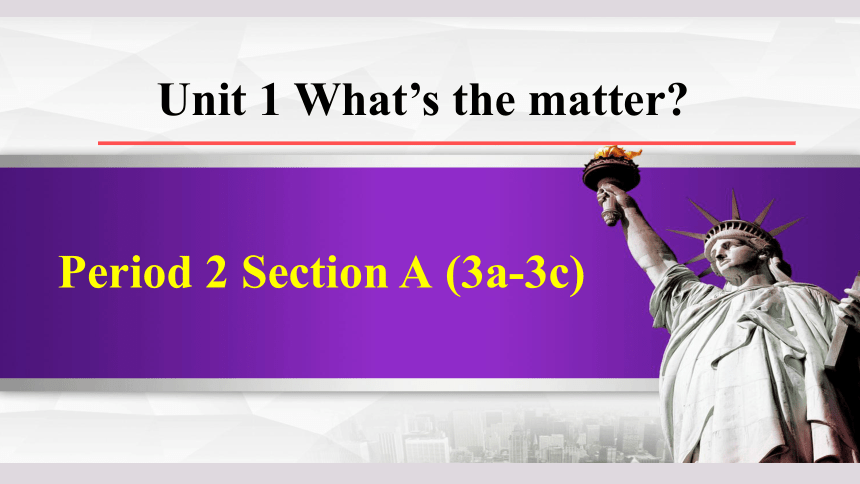
|
|
| 格式 | pptx | ||
| 文件大小 | 12.4MB | ||
| 资源类型 | 教案 | ||
| 版本资源 | 人教新目标(Go for it)版 | ||
| 科目 | 英语 | ||
| 更新时间 | 2024-10-30 21:17:04 | ||
图片预览

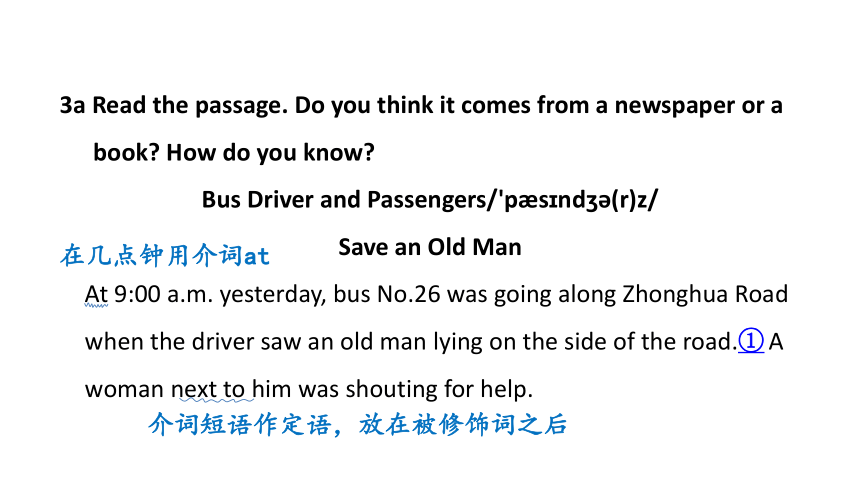
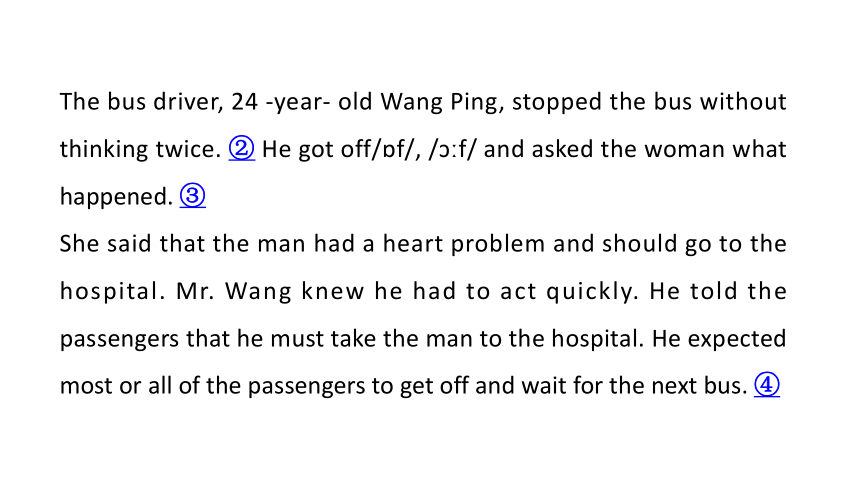
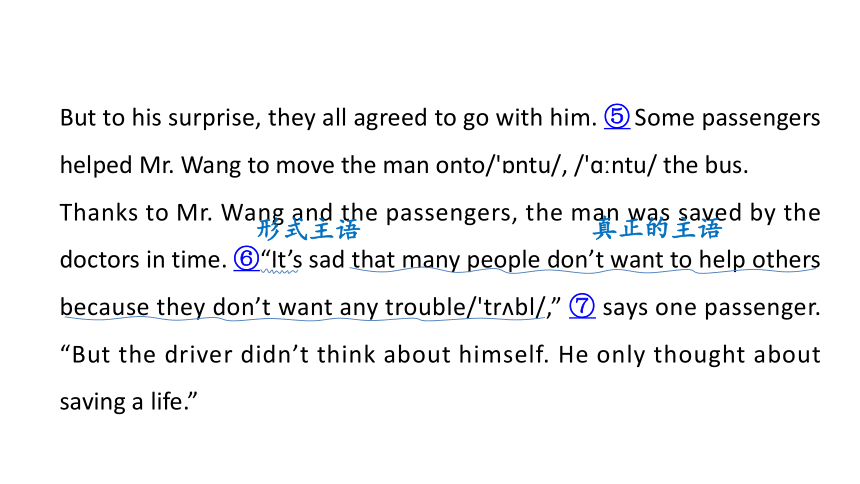
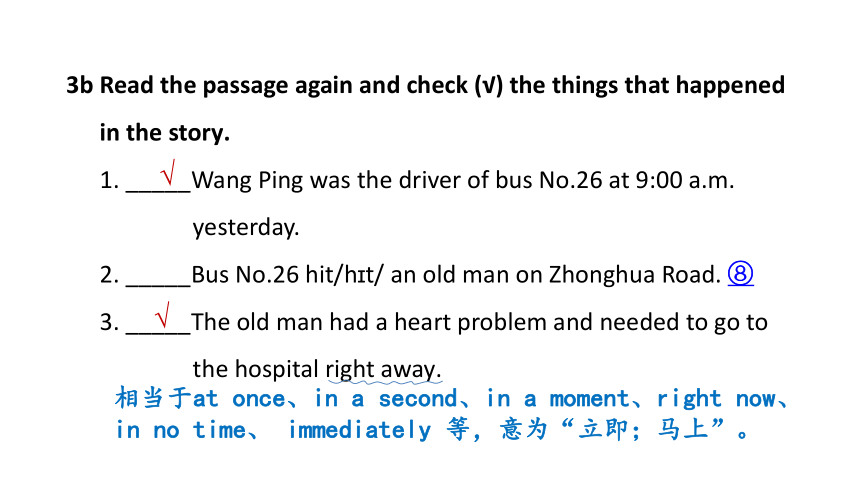
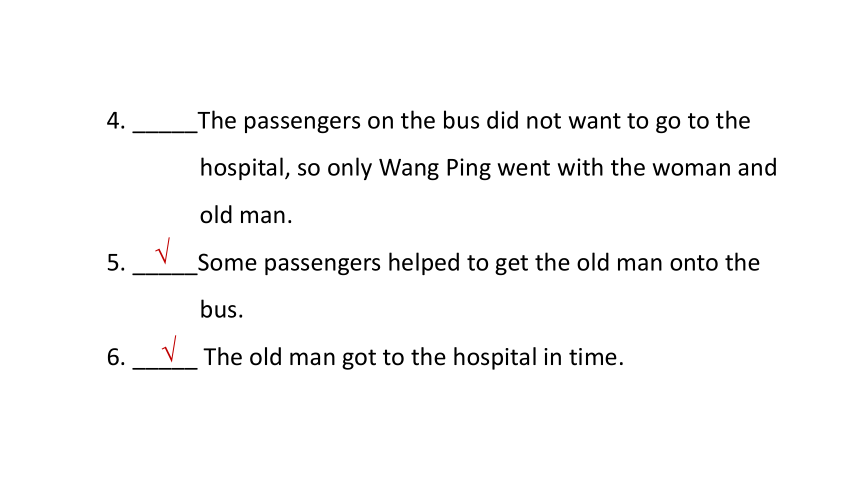

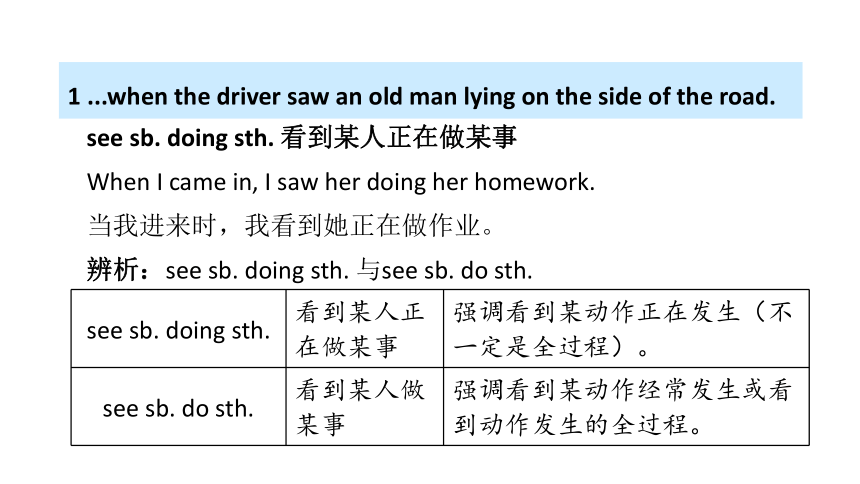
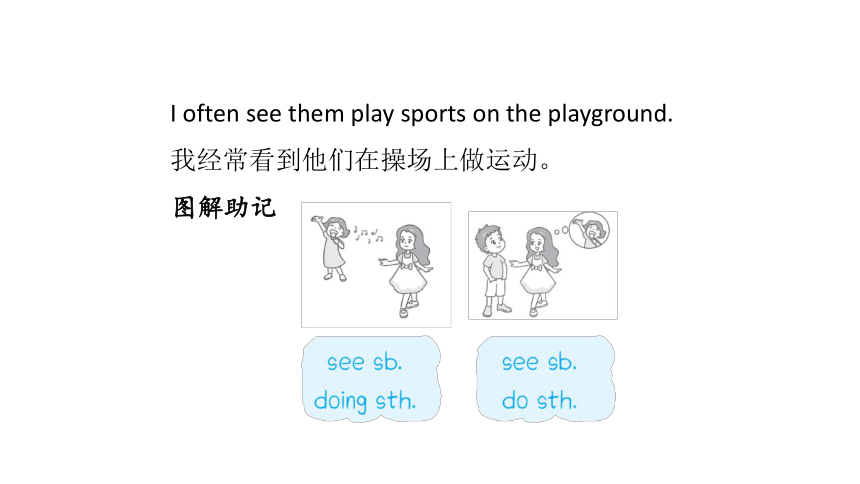
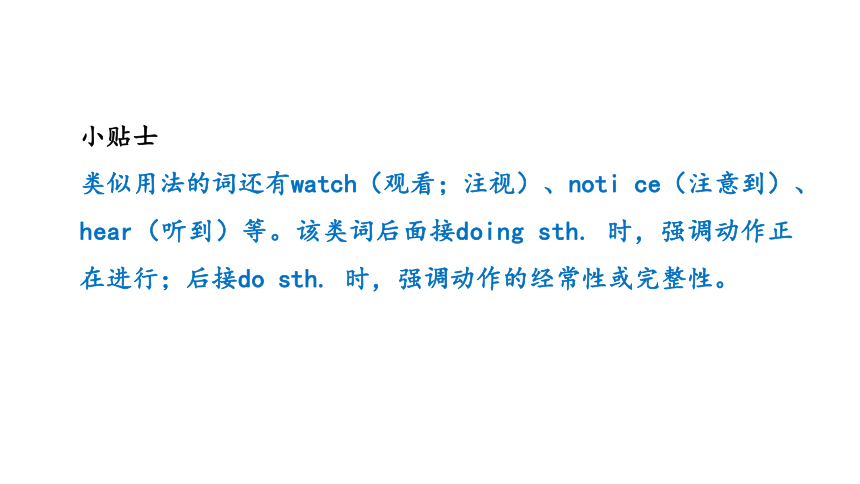
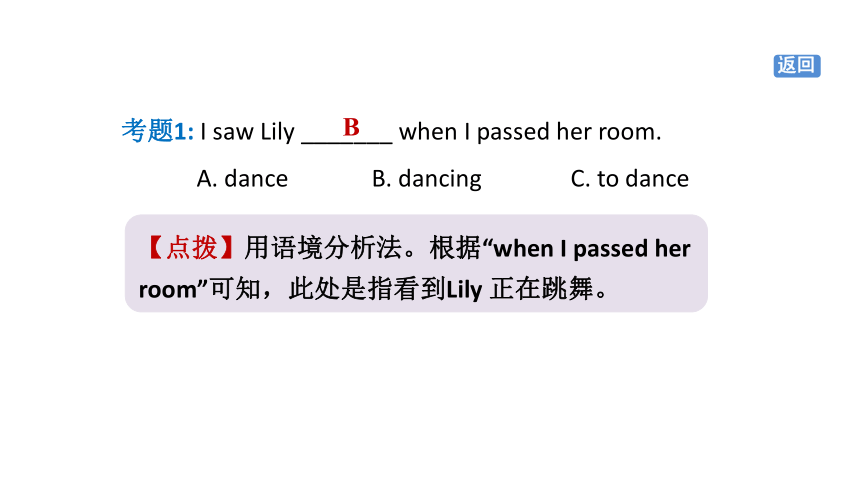
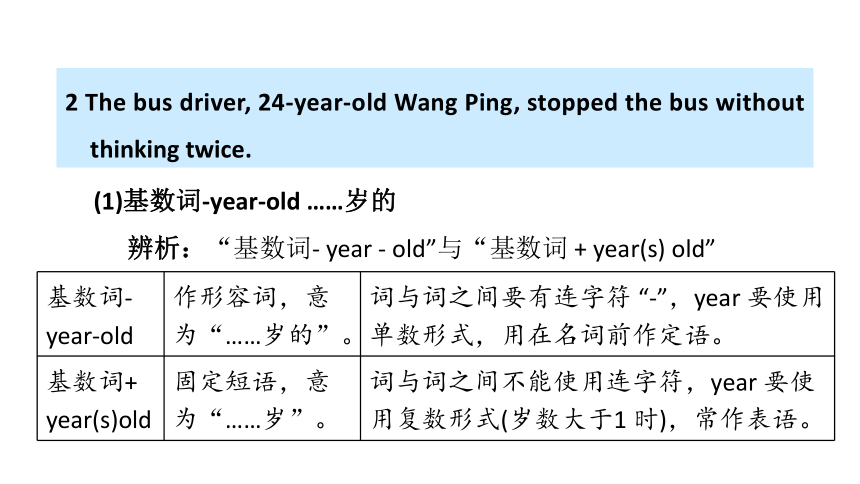
文档简介
(共50张PPT)
Period 2 Section A (3a-3c)
Unit 1 What’s the matter
3a Read the passage. Do you think it comes from a newspaper or a book How do you know
Bus Driver and Passengers/'p s nd (r)z/
Save an Old Man
At 9:00 a.m. yesterday, bus No.26 was going along Zhonghua Road when the driver saw an old man lying on the side of the road.① A woman next to him was shouting for help.
在几点钟用介词at
介词短语作定语,放在被修饰词之后
The bus driver, 24 -year- old Wang Ping, stopped the bus without thinking twice. ② He got off/ f/, / f/ and asked the woman what happened. ③
She said that the man had a heart problem and should go to the hospital. Mr. Wang knew he had to act quickly. He told the passengers that he must take the man to the hospital. He expected most or all of the passengers to get off and wait for the next bus. ④
But to his surprise, they all agreed to go with him. ⑤ Some passengers helped Mr. Wang to move the man onto/' ntu/, /'ɑ ntu/ the bus.
Thanks to Mr. Wang and the passengers, the man was saved by the doctors in time. ⑥“It’s sad that many people don’t want to help others because they don’t want any trouble/'tr bl/,” ⑦ says one passenger. “But the driver didn’t think about himself. He only thought about saving a life.”
形式主语
真正的主语
3b Read the passage again and check (√) the things that happened in the story.
1. _____Wang Ping was the driver of bus No.26 at 9:00 a.m. yesterday.
2. _____Bus No.26 hit/h t/ an old man on Zhonghua Road. ⑧
3. _____The old man had a heart problem and needed to go to the hospital right away.
相当于at once、in a second、in a moment、right now、in no time、 immediately 等,意为“立即;马上”。
√
√
4. _____The passengers on the bus did not want to go to the hospital, so only Wang Ping went with the woman and old man.
5. _____Some passengers helped to get the old man onto the bus.
6. _____ The old man got to the hospital in time.
√
√
3c Discuss the questions with a partner.
1. Why was Wang Ping surprised that the passengers agreed to go to the hospital with him
2. Did the passengers think Wang Ping did the right thing How do you know
3. Do you agree that people often do not help others because they do not want to get into trouble Why or why not
陷入困境/麻烦
1 ...when the driver saw an old man lying on the side of the road.
see sb. doing sth. 看到某人正在做某事
When I came in, I saw her doing her homework.
当我进来时,我看到她正在做作业。
辨析:see sb. doing sth. 与see sb. do sth.
see sb. doing sth. 看到某人正在做某事 强调看到某动作正在发生(不一定是全过程)。
see sb. do sth. 看到某人做某事 强调看到某动作经常发生或看到动作发生的全过程。
I often see them play sports on the playground.
我经常看到他们在操场上做运动。
图解助记
小贴士
类似用法的词还有watch(观看;注视)、noti ce(注意到)、hear(听到)等。该类词后面接doing sth. 时,强调动作正在进行;后接do sth. 时,强调动作的经常性或完整性。
考题1: I saw Lily _______ when I passed her room.
A. dance B. dancing C. to dance
B
返回
【点拨】用语境分析法。根据“when I passed her room”可知,此处是指看到Lily 正在跳舞。
2 The bus driver, 24-year-old Wang Ping, stopped the bus without thinking twice.
(1)基数词-year-old ……岁的
辨析:“基数词- year - old”与“基数词 + year(s) old”
基数词- year-old 作形容词,意 为“……岁的”。 词与词之间要有连字符 “-”,year 要使用单数形式,用在名词前作定语。
基数词+ year(s)old 固定短语,意 为“……岁”。 词与词之间不能使用连字符,year 要使用复数形式(岁数大于1 时),常作表语。
Li Mei, a ten-year-old girl, comes from a small village.
李梅,一个十岁的女孩,来自一个小村庄。
He is thirteen years old this year. 今年他十三岁了。
特别提醒
基数词-year-old 通常和不定冠词放在一起考查。考查时,前面的基数词通常使用阿拉伯数字,常见的是“8”和“11”,此时前面的不定冠词应使用an,因为eight 和eleven 的发音都是以元音音素开头。
考题2: An ______ boy, Li Wen, works hard and gets good grades in his final exam.
A. eighteen-year-olds B. eighteen-year-old
C. eighteen years old
B
(2) think twice 认真思考;权衡利弊
Think twice before sharing information online!
在网上分享信息之前要三思!
You need to think twice about the matter. 这事你要三思。
I always think of you as one of my family.
我一直把你当成自家人。
think twice 相当于hold one’s horses(沉住气)。
think twice about (doing) sth. 再三考虑(做)某事。
由think 构成的短语还有:
① think of 想起;认为
② think up 想出
③ think over 仔细考虑
④ think about 考虑
考题3: —When we are in danger, we should keep our cool.
—You are right. We must do it after _________________(认真思考).
thinking twice
返回
3 He got off and asked the woman what happened.
(1) get off 下车
get off 指下公交车、火车或飞机等。其反义短语为get on。
We didn’t get off until the bus stopped.
直到公共汽车停了我们才下了车。
Where do we get on the bus 我们在哪儿上公共汽车?
拓展: get into 和get out of 指上/ 下小型交通工具,比如小汽车、 出租车等。
This tall fellow has to bend in order to get into the car.
这个高个子男人要弯下腰才能进汽车。
It was good to get out of the car and stretch our legs.
下车活动活动腿脚,真不错。
Don’t put off today’s work till tomorrow.
今天的工作不要拖到明天。
图解助记
考题4: [恩施] It’s good to help the people in need to _______ the bus if necessary.
A. get up B. get off C. get well
B
【点拨】用短语辨析法。get up 起床;get off 下车;get well 恢复健康。根据句意可知,此处指帮助有需要的人下车。
“动词+ off”构成的短语还有:
put off 推迟
go off(闹钟)发出响声
turn off 关掉
take off 脱下;起飞
(2) happen /'h p n/ v. 发生
What happened to him last week
上周他发生了什么事?
It’s the best thing that has ever happened to me.
这是发生在我身上的最好的事。
敲黑板
happen 不能用于被动语态。
happen 的常见用法:
① sth. happened/ happens to sb. 某人发生某事
② sth. happened/happens +时间状语/ 地点状语
在某时/ 某地发生了某事
辨析:happen 与take place
happen 指偶然发生,其主语通常是物,常与介词to 搭配后再接宾语。
take place 指有计划地发生,后一般不接宾语。
An accident happened on the street yesterday.
昨天这条街上发生了一起事故。
Our school sports meeting will take place next week.
我们的校运动会将在下周举行。
拓展:happen 还有“碰巧”之意。happen to do sth. 意为“碰巧做某事”。It happens that... 意为“碰巧……”。
I happened to see him on the street.
我碰巧在街上看到了他。
It happened that I was out when he called me.
他给我打电话时我碰巧出去了。
谚语记单词
It is the unforeseen that always happens.
天有不测风云,人有旦夕祸福。
考题5: [杭州] I like to follow the story and see what will
h next.
appen
返回
【点拨】根据“see what will”和首字母提示可知,看看将发生什么,will 后接动词原形。
4 He expected most or all of the passengers to get off and wait for the next bus.
expect / k'spekt/ v. 预料;期待
My father and I really expected the roast duck because it was our favourite. 我和父亲真的很期待烤鸭,因为它是我们的最爱。
I expected to get there on time. 我期待能按时到达那里。
My parents expect me to go into a good university.
我父母期待我进入一所好大学。
You have a right to expect what I expect.
你有权利期待我所期待的一切。
拓展:be expected to do sth. 被期望做某事
You are expected to say hello to him.
你被期望跟他打招呼。
expect 的用法:
① expect sth. 期待某事/ 某物
② expect to do sth. 期待做某事
③ expect sb. to do sth. 期待某人做某事
④ expect+ 宾语从句 期待……
考题6: The composer(作曲家)who created Learn from the Role Model Lei Feng (《学习雷锋好榜样》) didn’t __________(预料;期待) the song would be enjoyed by many people for more than 60 years.
expect
返回
5 But to his surprise, they all agreed to go with him.
(1)(重点)to one’s surprise 使……惊讶的是;出乎……的意料
To her surprise, her mother didn’t tell her the truth.
令她惊讶的是,她的妈妈没有告诉她真相。
To our great surprise, he didn’t pass the driving test.
令我们非常惊讶的是,他没有通过驾驶考试。
To my shame, I never thanked him for his kindness.
令我羞愧的是,我从未感谢过他的好意。
小贴士
to one’s surprise 常位于句首,其后加“,”,有时在surprise 前加big/ great 等词表示程度。
考题7: [十堰] —______ my surprise, the restaurant is actually very nice.
—The service is also great.
A. In B. At
C. On D. To
D
类似“to+one’s + 带感彩的名词”的表达还有:
to one’s joy/happiness 令/使某人高兴/ 幸福的是
to one’s disappointment 令/使某人失望的是
to one’s shame 令/使某人羞愧的是
to one’s satisfaction 令/使某人满意的是
(2)(重点)agree to do sth. 同意做某事
In the end, he agreed to go there with us.
最后,他同意和我们去那里。
Do you agree with me 你同意我的想法吗?
Can we agree on a date 我们能不能商定一个日期?
You’ll have to get your parents’ agreement if you want to go on the trip. 如果你要想去旅行就必须征得你父母的同意。
Some people disagree with this argument. 有些人不同意这一论点。
agree 的其他常用搭配:
① agree with sb.
同意某人的观点、想法
② agree on sth.
就某事取得一致意见
agree 的相关词:
agreement n. 同意
disagree v. 不同意
(agree 的反义词)
考题8: 我最好的朋友同意和我一起去淄博品尝那里的美食。
My best friend _________ _________ _________ to Zibo with me to taste the delicious food there.
agrees to go
返回
6 Thanks to Mr. Wang and the passengers...
(高频)thanks to 幸亏;由于
Success came quickly, thanks to a mixture of talent, enterprise and luck. 由于天赋、努力和运气的综合作用,成功来得很快。
Thanks to you, we finished the task on time.
多亏你们,我们按时完成了这项任务。
Thanks for giving me so much help. 谢谢你给我那么多帮助。
thanks to 在句中作状语,
常位于句首。
=Thank you for
辨析:thanks to 与thanks for
thanks to “多亏;由于”,后接名词或代词。thanks to 不能改成thank you to。
thanks for “因…… 而感谢”,后接感谢的原因。
thanks for 可以换成thank you for。
考题9: ________the help of the government, farmers in China are living a happier and richer life.
A. Thankful to B. Thanks for
C. Thanks to D. Thankful for
C
返回
7 ...they don’t want any trouble,”
trouble /'tr bl/ n. 问题;苦恼
A true friend is a person who can help you when you are in trouble. 真正的朋友是在你困难时能帮助你的人。
Her son got into trouble again yesterday.
昨天她儿子又陷入困境了。
We have trouble getting staff. 我们在招聘职员方面有困难。
He has trouble with his math. 他数学学得不好。
不可数名词
I love my parents because they take the trouble to bring me up.
我爱我的父母因为他们不辞辛劳地把我养大。
拓展:(1)What’s your trouble /What’s the trouble with you 为交际用语,意为“你怎么了?”。
—What’s the trouble with you 你怎么了?
—I’ve got a headache and a bad cold. 我头疼,得了重感冒。
(2)trouble 还可以作动词,意为“使忧虑;打扰”。
Could I trouble you for a minute 我能打扰你一下吗?
trouble的固定搭配:
① in trouble 处于困境中
② get into trouble 陷入困境
③ have trouble(in)doing sth. 做某事有困难/麻烦
④ have trouble with sth./sb. 做某事有困难/与某人有矛盾
⑤ take the trouble to do sth.
费力做某事;不辞辛劳地做某事
一语辨异:
Don’t trouble trouble until trouble troubles you.
不要庸人自扰。
考题10: With our teacher’s help, we don’t have any trouble ____________(learn)English.
learning
返回
8 Bus No. 26 hit an old man on Zhonghua Road.
hit /h t/ v.(用手或器具)击;打(hit-hit-hit; hitting)
表达“击/打某人身体的某部位”用“hit sb. on/in the+身体部位”。
He hit the boy on the back. 他打了男孩的背。
A bullet hit him on the left leg. 一颗子弹击中了他的左腿。
特别提醒
打在人体硬部位上用介词on, 软部位上用介词in, 且结构中的定冠词the 通常不可用物主代词my, his 等代替。
拓展:(1)hit 作动词时,还可意为“碰撞;袭击”。
The ship hit a rock and stopped. 船触礁停了下来。
A terrible storm hit this area. 一场猛烈的暴雨袭击了这个地区。
(2)hit还可作名词,意为“打;击;击中;很受欢迎的人(或事物)”。
Give it a good hit. 用力打它一下。
The movie became a hit all over China. 这部电影在中国风靡一时。
考题11: Suddenly, a stone h him on the back.
it
返回
Period 2 Section A (3a-3c)
Unit 1 What’s the matter
3a Read the passage. Do you think it comes from a newspaper or a book How do you know
Bus Driver and Passengers/'p s nd (r)z/
Save an Old Man
At 9:00 a.m. yesterday, bus No.26 was going along Zhonghua Road when the driver saw an old man lying on the side of the road.① A woman next to him was shouting for help.
在几点钟用介词at
介词短语作定语,放在被修饰词之后
The bus driver, 24 -year- old Wang Ping, stopped the bus without thinking twice. ② He got off/ f/, / f/ and asked the woman what happened. ③
She said that the man had a heart problem and should go to the hospital. Mr. Wang knew he had to act quickly. He told the passengers that he must take the man to the hospital. He expected most or all of the passengers to get off and wait for the next bus. ④
But to his surprise, they all agreed to go with him. ⑤ Some passengers helped Mr. Wang to move the man onto/' ntu/, /'ɑ ntu/ the bus.
Thanks to Mr. Wang and the passengers, the man was saved by the doctors in time. ⑥“It’s sad that many people don’t want to help others because they don’t want any trouble/'tr bl/,” ⑦ says one passenger. “But the driver didn’t think about himself. He only thought about saving a life.”
形式主语
真正的主语
3b Read the passage again and check (√) the things that happened in the story.
1. _____Wang Ping was the driver of bus No.26 at 9:00 a.m. yesterday.
2. _____Bus No.26 hit/h t/ an old man on Zhonghua Road. ⑧
3. _____The old man had a heart problem and needed to go to the hospital right away.
相当于at once、in a second、in a moment、right now、in no time、 immediately 等,意为“立即;马上”。
√
√
4. _____The passengers on the bus did not want to go to the hospital, so only Wang Ping went with the woman and old man.
5. _____Some passengers helped to get the old man onto the bus.
6. _____ The old man got to the hospital in time.
√
√
3c Discuss the questions with a partner.
1. Why was Wang Ping surprised that the passengers agreed to go to the hospital with him
2. Did the passengers think Wang Ping did the right thing How do you know
3. Do you agree that people often do not help others because they do not want to get into trouble Why or why not
陷入困境/麻烦
1 ...when the driver saw an old man lying on the side of the road.
see sb. doing sth. 看到某人正在做某事
When I came in, I saw her doing her homework.
当我进来时,我看到她正在做作业。
辨析:see sb. doing sth. 与see sb. do sth.
see sb. doing sth. 看到某人正在做某事 强调看到某动作正在发生(不一定是全过程)。
see sb. do sth. 看到某人做某事 强调看到某动作经常发生或看到动作发生的全过程。
I often see them play sports on the playground.
我经常看到他们在操场上做运动。
图解助记
小贴士
类似用法的词还有watch(观看;注视)、noti ce(注意到)、hear(听到)等。该类词后面接doing sth. 时,强调动作正在进行;后接do sth. 时,强调动作的经常性或完整性。
考题1: I saw Lily _______ when I passed her room.
A. dance B. dancing C. to dance
B
返回
【点拨】用语境分析法。根据“when I passed her room”可知,此处是指看到Lily 正在跳舞。
2 The bus driver, 24-year-old Wang Ping, stopped the bus without thinking twice.
(1)基数词-year-old ……岁的
辨析:“基数词- year - old”与“基数词 + year(s) old”
基数词- year-old 作形容词,意 为“……岁的”。 词与词之间要有连字符 “-”,year 要使用单数形式,用在名词前作定语。
基数词+ year(s)old 固定短语,意 为“……岁”。 词与词之间不能使用连字符,year 要使用复数形式(岁数大于1 时),常作表语。
Li Mei, a ten-year-old girl, comes from a small village.
李梅,一个十岁的女孩,来自一个小村庄。
He is thirteen years old this year. 今年他十三岁了。
特别提醒
基数词-year-old 通常和不定冠词放在一起考查。考查时,前面的基数词通常使用阿拉伯数字,常见的是“8”和“11”,此时前面的不定冠词应使用an,因为eight 和eleven 的发音都是以元音音素开头。
考题2: An ______ boy, Li Wen, works hard and gets good grades in his final exam.
A. eighteen-year-olds B. eighteen-year-old
C. eighteen years old
B
(2) think twice 认真思考;权衡利弊
Think twice before sharing information online!
在网上分享信息之前要三思!
You need to think twice about the matter. 这事你要三思。
I always think of you as one of my family.
我一直把你当成自家人。
think twice 相当于hold one’s horses(沉住气)。
think twice about (doing) sth. 再三考虑(做)某事。
由think 构成的短语还有:
① think of 想起;认为
② think up 想出
③ think over 仔细考虑
④ think about 考虑
考题3: —When we are in danger, we should keep our cool.
—You are right. We must do it after _________________(认真思考).
thinking twice
返回
3 He got off and asked the woman what happened.
(1) get off 下车
get off 指下公交车、火车或飞机等。其反义短语为get on。
We didn’t get off until the bus stopped.
直到公共汽车停了我们才下了车。
Where do we get on the bus 我们在哪儿上公共汽车?
拓展: get into 和get out of 指上/ 下小型交通工具,比如小汽车、 出租车等。
This tall fellow has to bend in order to get into the car.
这个高个子男人要弯下腰才能进汽车。
It was good to get out of the car and stretch our legs.
下车活动活动腿脚,真不错。
Don’t put off today’s work till tomorrow.
今天的工作不要拖到明天。
图解助记
考题4: [恩施] It’s good to help the people in need to _______ the bus if necessary.
A. get up B. get off C. get well
B
【点拨】用短语辨析法。get up 起床;get off 下车;get well 恢复健康。根据句意可知,此处指帮助有需要的人下车。
“动词+ off”构成的短语还有:
put off 推迟
go off(闹钟)发出响声
turn off 关掉
take off 脱下;起飞
(2) happen /'h p n/ v. 发生
What happened to him last week
上周他发生了什么事?
It’s the best thing that has ever happened to me.
这是发生在我身上的最好的事。
敲黑板
happen 不能用于被动语态。
happen 的常见用法:
① sth. happened/ happens to sb. 某人发生某事
② sth. happened/happens +时间状语/ 地点状语
在某时/ 某地发生了某事
辨析:happen 与take place
happen 指偶然发生,其主语通常是物,常与介词to 搭配后再接宾语。
take place 指有计划地发生,后一般不接宾语。
An accident happened on the street yesterday.
昨天这条街上发生了一起事故。
Our school sports meeting will take place next week.
我们的校运动会将在下周举行。
拓展:happen 还有“碰巧”之意。happen to do sth. 意为“碰巧做某事”。It happens that... 意为“碰巧……”。
I happened to see him on the street.
我碰巧在街上看到了他。
It happened that I was out when he called me.
他给我打电话时我碰巧出去了。
谚语记单词
It is the unforeseen that always happens.
天有不测风云,人有旦夕祸福。
考题5: [杭州] I like to follow the story and see what will
h next.
appen
返回
【点拨】根据“see what will”和首字母提示可知,看看将发生什么,will 后接动词原形。
4 He expected most or all of the passengers to get off and wait for the next bus.
expect / k'spekt/ v. 预料;期待
My father and I really expected the roast duck because it was our favourite. 我和父亲真的很期待烤鸭,因为它是我们的最爱。
I expected to get there on time. 我期待能按时到达那里。
My parents expect me to go into a good university.
我父母期待我进入一所好大学。
You have a right to expect what I expect.
你有权利期待我所期待的一切。
拓展:be expected to do sth. 被期望做某事
You are expected to say hello to him.
你被期望跟他打招呼。
expect 的用法:
① expect sth. 期待某事/ 某物
② expect to do sth. 期待做某事
③ expect sb. to do sth. 期待某人做某事
④ expect+ 宾语从句 期待……
考题6: The composer(作曲家)who created Learn from the Role Model Lei Feng (《学习雷锋好榜样》) didn’t __________(预料;期待) the song would be enjoyed by many people for more than 60 years.
expect
返回
5 But to his surprise, they all agreed to go with him.
(1)(重点)to one’s surprise 使……惊讶的是;出乎……的意料
To her surprise, her mother didn’t tell her the truth.
令她惊讶的是,她的妈妈没有告诉她真相。
To our great surprise, he didn’t pass the driving test.
令我们非常惊讶的是,他没有通过驾驶考试。
To my shame, I never thanked him for his kindness.
令我羞愧的是,我从未感谢过他的好意。
小贴士
to one’s surprise 常位于句首,其后加“,”,有时在surprise 前加big/ great 等词表示程度。
考题7: [十堰] —______ my surprise, the restaurant is actually very nice.
—The service is also great.
A. In B. At
C. On D. To
D
类似“to+one’s + 带感彩的名词”的表达还有:
to one’s joy/happiness 令/使某人高兴/ 幸福的是
to one’s disappointment 令/使某人失望的是
to one’s shame 令/使某人羞愧的是
to one’s satisfaction 令/使某人满意的是
(2)(重点)agree to do sth. 同意做某事
In the end, he agreed to go there with us.
最后,他同意和我们去那里。
Do you agree with me 你同意我的想法吗?
Can we agree on a date 我们能不能商定一个日期?
You’ll have to get your parents’ agreement if you want to go on the trip. 如果你要想去旅行就必须征得你父母的同意。
Some people disagree with this argument. 有些人不同意这一论点。
agree 的其他常用搭配:
① agree with sb.
同意某人的观点、想法
② agree on sth.
就某事取得一致意见
agree 的相关词:
agreement n. 同意
disagree v. 不同意
(agree 的反义词)
考题8: 我最好的朋友同意和我一起去淄博品尝那里的美食。
My best friend _________ _________ _________ to Zibo with me to taste the delicious food there.
agrees to go
返回
6 Thanks to Mr. Wang and the passengers...
(高频)thanks to 幸亏;由于
Success came quickly, thanks to a mixture of talent, enterprise and luck. 由于天赋、努力和运气的综合作用,成功来得很快。
Thanks to you, we finished the task on time.
多亏你们,我们按时完成了这项任务。
Thanks for giving me so much help. 谢谢你给我那么多帮助。
thanks to 在句中作状语,
常位于句首。
=Thank you for
辨析:thanks to 与thanks for
thanks to “多亏;由于”,后接名词或代词。thanks to 不能改成thank you to。
thanks for “因…… 而感谢”,后接感谢的原因。
thanks for 可以换成thank you for。
考题9: ________the help of the government, farmers in China are living a happier and richer life.
A. Thankful to B. Thanks for
C. Thanks to D. Thankful for
C
返回
7 ...they don’t want any trouble,”
trouble /'tr bl/ n. 问题;苦恼
A true friend is a person who can help you when you are in trouble. 真正的朋友是在你困难时能帮助你的人。
Her son got into trouble again yesterday.
昨天她儿子又陷入困境了。
We have trouble getting staff. 我们在招聘职员方面有困难。
He has trouble with his math. 他数学学得不好。
不可数名词
I love my parents because they take the trouble to bring me up.
我爱我的父母因为他们不辞辛劳地把我养大。
拓展:(1)What’s your trouble /What’s the trouble with you 为交际用语,意为“你怎么了?”。
—What’s the trouble with you 你怎么了?
—I’ve got a headache and a bad cold. 我头疼,得了重感冒。
(2)trouble 还可以作动词,意为“使忧虑;打扰”。
Could I trouble you for a minute 我能打扰你一下吗?
trouble的固定搭配:
① in trouble 处于困境中
② get into trouble 陷入困境
③ have trouble(in)doing sth. 做某事有困难/麻烦
④ have trouble with sth./sb. 做某事有困难/与某人有矛盾
⑤ take the trouble to do sth.
费力做某事;不辞辛劳地做某事
一语辨异:
Don’t trouble trouble until trouble troubles you.
不要庸人自扰。
考题10: With our teacher’s help, we don’t have any trouble ____________(learn)English.
learning
返回
8 Bus No. 26 hit an old man on Zhonghua Road.
hit /h t/ v.(用手或器具)击;打(hit-hit-hit; hitting)
表达“击/打某人身体的某部位”用“hit sb. on/in the+身体部位”。
He hit the boy on the back. 他打了男孩的背。
A bullet hit him on the left leg. 一颗子弹击中了他的左腿。
特别提醒
打在人体硬部位上用介词on, 软部位上用介词in, 且结构中的定冠词the 通常不可用物主代词my, his 等代替。
拓展:(1)hit 作动词时,还可意为“碰撞;袭击”。
The ship hit a rock and stopped. 船触礁停了下来。
A terrible storm hit this area. 一场猛烈的暴雨袭击了这个地区。
(2)hit还可作名词,意为“打;击;击中;很受欢迎的人(或事物)”。
Give it a good hit. 用力打它一下。
The movie became a hit all over China. 这部电影在中国风靡一时。
考题11: Suddenly, a stone h him on the back.
it
返回
同课章节目录
- Unit 1 What's the matter?
- Section A
- Section B
- Unit 2 I'll help to clean up the city parks.
- Section A
- Section B
- Unit 3 Could you please clean your room?
- Section A
- Section B
- Unit 4 Why don't you talk to your parents?
- Section A
- Section B
- Unit 5 What were you doing when the rainstorm came
- Section A
- Section B
- Review of Units 1-5
- Unit 6 An old man tried to move the mountains.
- Section A
- Section B
- Unit 7 What's the highest mountain in the world?
- Section A
- Section B
- Unit 8 Have you read Treasure Island yet?
- Section A
- Section B
- Unit 9 Have you ever been to a museum?
- Section A
- Section B
- Unit 10 I've had this bike for three years.
- Section A
- Section B
